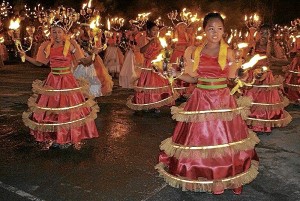Mindoreños dance like fireflies

PERFORMERS from Bansud town brought home the grand prize in the “Pandang-Gitab” Festival of Oriental Mindoro, which was held in Calapan City. PHOTO COURTESY OF THE PROVINCIAL GOVERNMENT OF ORIENTAL MINDORO
The practice of Mindoro women carrying oil lamps with lighted wicks flickering like fireflies as they send off their husbands in the cold early morning hours to fish out to the open sea became the inspiration for the official festival of Oriental Mindoro.
The “Pandang-Gitab” or “Festival of Lights” showcases the province’s culture to attract local and foreign tourists, according to Vice Gov. Humerlito Dolor.
Highlight of the festival is the street dance, “Pandang-Gitab,” which is inspired by the folk dance “Pandanggo sa Ilaw.” With graceful, shallow gyrating of hips and torso, dancers hold lighted lamps on the palms and head.
Joey Antonio, a folk choreographer, and government employees Patti Raymundo, Robert Sarguilla and Troy Francisco coined Pandang-Gitab from pandanggo, which means local dance, and dagitab, a handmade lamp or portable light.
“Compared with Pandanggo sa Ilaw, Pandang-Gitab is a faster version,” said Orlando Tizon, officer in charge of the Investment and Enterprise Development Office of the provincial tourism office which took care of the festival’s staging.
Article continues after this advertisementOn Feb. 23, the festival was held for the first time in the City of Calapan after it was officially recognized as representative of the province’s cultural heritage under an ordinance passed in November last year .
Article continues after this advertisementTizon said some 3,000 people joined the street dance. They belonged to eight contingents from different parts of the province.
Susan Cruz, which coordinated the event with Tizon, said the dancers included high school and college students, out-of-school youths and senior citizens.
Pandang-Gitab is unique because unlike many other street dances, which makes use of drums like the Ati-Atihan, it makes use of “natural light,” Cruz said, referring to candles placed inside glass jars or oil lamps made of capiz, bamboo or coconut shells.
“We prohibit battery and electric-powered lights,” she said.
On Feb. 23, Calapan’s main street, J.P. Rizal, came to life as lights flickered at night.
“Even with the unexpected rain shower, the contingents were dancing in the streets all the way to the Jose Leido Memorial School Grandstand,” Cruz said. She said local leaders want the event moved to the third Saturday of February next year when they could expect better weather.
Cruz said the Catholic Church showed support for the festival, directing the ringing of church bells and praying the Angelus at Santo Niño Cathedral beside the plaza.
The Bansud contingent brought home the grand prize of P200,000 in the street-dancing competition, while those from Baco and San Teodoro towns placed second and third.
Bansud will represent Oriental Mindoro to the Aliwan Festival on April 11-13 in Manila. In 2011, Oriental Mindoro won fifth place while last year, it placed seventh from among 20 contingents from across the country.
Dubbed “mother of all fiestas,” the Aliwan has contingents competing with a maximum number of 120 dancers. Started in 2003, it aims to showcase Filipino culture not just in Metro Manila but to the rest of the world.